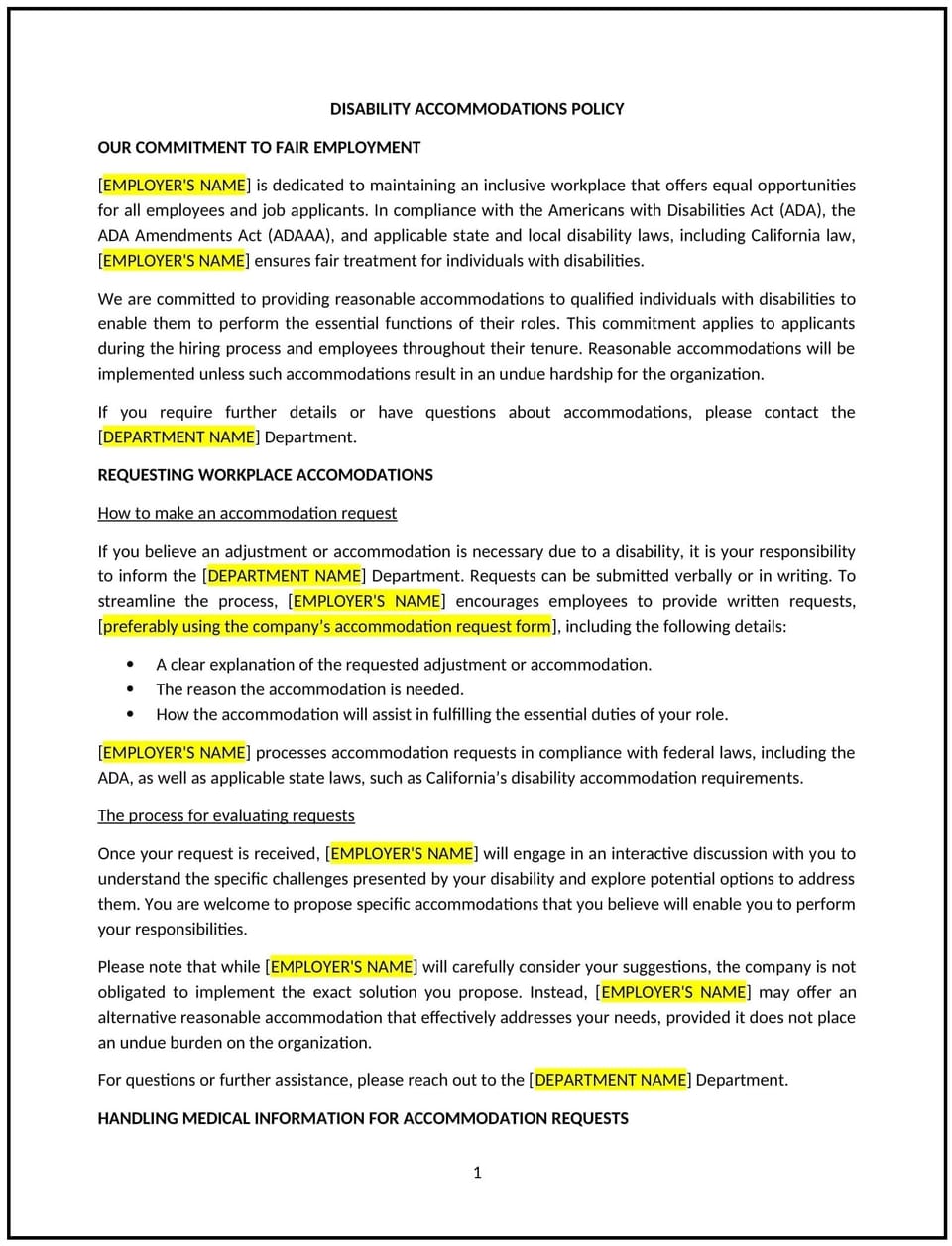Disability accommodations policy (California): Free template

Disability accommodations policy (California)
In California, a disability accommodations policy provides businesses with guidelines for supporting employees with disabilities by offering reasonable accommodations that enable them to perform their job duties effectively. This policy helps businesses comply with the California Fair Employment and Housing Act (FEHA) and the Americans with Disabilities Act (ADA).
This policy outlines the process for requesting accommodations, the evaluation of requests, and the business’s commitment to fostering an inclusive workplace. By implementing this policy, California businesses can support employee success while meeting legal obligations.
How to use this disability accommodations policy (California)
- Define reasonable accommodations: Specify the types of adjustments that may be provided, such as modified schedules, assistive technology, or workspace changes.
- Establish request procedures: Provide clear steps for employees to request accommodations, including how to notify HR or management.
- Outline evaluation steps: Detail how the business will assess accommodation requests and determine their feasibility based on operational needs.
- Communicate employee rights: Ensure employees understand their rights under FEHA and ADA and the business’s commitment to inclusivity.
- Document accommodations: Maintain records of requests, evaluations, and accommodations provided to support consistency and compliance.
Benefits of using this disability accommodations policy (California)
This policy offers several advantages for California businesses:
- Supports compliance: Reflects California and federal laws requiring reasonable accommodations for employees with disabilities.
- Promotes inclusivity: Demonstrates the business’s commitment to creating an equitable and supportive workplace.
- Enhances employee morale: Helps employees feel valued and supported, fostering loyalty and engagement.
- Reduces risks: Minimizes potential legal disputes related to non-compliance or discrimination claims.
- Encourages accountability: Provides a structured process for addressing accommodation requests fairly and consistently.
Tips for using this disability accommodations policy (California)
- Reflect California-specific laws: Address requirements under FEHA, which may provide broader protections than federal laws.
- Train managers: Educate supervisors on recognizing accommodation requests and managing them appropriately.
- Collaborate with employees: Work with employees to identify accommodations that meet their needs without undue hardship to the business.
- Monitor accommodations: Periodically review accommodations to ensure they remain effective and aligned with the employee’s needs.
- Review regularly: Update the policy to reflect changes in California laws, workplace practices, or industry standards.
Q: How does this policy benefit the business?
A: This policy supports compliance with California and federal disability laws, promotes inclusivity, and helps the business retain valuable talent.
Q: What are examples of reasonable accommodations under this policy?
A: Examples include modified work schedules, assistive devices, ergonomic adjustments, or remote work options, depending on the employee’s needs and the role.
Q: How does this policy support compliance with California laws?
A: The policy reflects requirements under FEHA and ADA, supporting lawful and fair handling of disability accommodation requests.
Q: What steps should employees take to request accommodations?
A: Employees should notify HR or management of their needs, provide any necessary documentation, and collaborate to identify effective accommodations.
Q: How can the business evaluate accommodation requests?
A: The business can assess requests based on feasibility, operational impact, and alignment with legal obligations, engaging in an interactive process with the employee.
This article contains general legal information and does not contain legal advice. Cobrief is not a law firm or a substitute for an attorney or law firm. The law is complex and changes often. For legal advice, please ask a lawyer.


